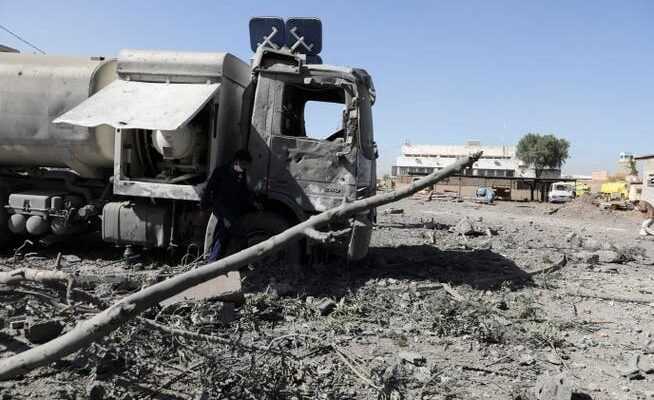Fierce fighting is going on again in Yemen. For the Saudi, a speedy end to the conflict does not seem to be a priority since they got rid of the role of international pariah.
Devastation near Sanaa airport following air strikes by Saudi Arabia-led coalition.
The coalition led by Saudi Arabia flew attacks on facilities of the Houthi rebels in the Yemeni capital Sanaa at the weekend as part of a “large-scale operation”. According to Yemeni doctors, three civilians, including a child, were killed in the city of Ajama, northwest of Sanaa, on Saturday. On Sunday, the coalition reportedly targeted a Houthi weapons depot in Sanaa. In the Saudi Arabian capital, Riyadh, a spokesman said the Iran-backed rebels were working tirelessly to “militarize” the Sanaa airport and using it as a base for launching ballistic missiles and drones.
The Saudi see the new attacks as retaliation for the regular attacks by the Houthi on military facilities and refineries in their country. In fact, the Houthi have been attacking targets in the Wahhabi kingdom for years, mostly with drones and missiles, some of which have even reached Riyadh. On Friday, three ballistic missiles fell in the Jazan region of Saudi Arabia, not far from the Yemeni border, allegedly killing two people. The Saudi leadership has asked the Houthis to stop these attacks immediately. For their part, the Houthis are threatening Riyadh with “painful consequences” if the “aggression” against Yemen is not ended immediately.
Sharp international criticism
For the Saudi leadership, it has been proven that the Iranians and Hezbollah are behind the activities of the Houthi. Fighters from the Lebanese Shiite militia, which is supported by the Iranian Revolutionary Guard and operates mainly in Lebanon and Syria, are teaching the Houthis how to set up explosive traps and shoot down drones. The military leadership in Riyadh has presented photos and videos that allegedly show Hezbollah members at military, logistical and technical courses in Sanaa.
The Houthi and Iran regularly deny these claims, but without being able to convince at the international level. It is now taken for granted that Iran will assist the Houthi. Timothy Lenderking, the American special envoy to Yemen, has described Tehran’s military assistance to the rebels as “considerable and fatal”. The US has criticized the most recent attacks by the Houthi with unusual sharpness. They prolonged the suffering of the Yemeni population and endangered the Saudi people and the more than 70,000 American citizens living in Saudi Arabia, the American embassy in Riyadh said.
The French ambassador to Saudi Arabia spoke of “barbaric” attacks by the Houthi in Jazan. That is very one-eyed in view of the ruthless and much more victimized Saudi action in Yemen. It is not surprising, however. Despite the war, Paris has had excellent relations with Riyadh for years. France is the third largest arms supplier to the Saudi, is training Saudi mercenaries and building expensive warships for Riyadh. At the beginning of December, President Macron threaded new bilateral agreements in Jidda at a meeting with Crown Prince Mohammed bin Salman. The Saudi have money, the Yemenis have none. Given these interests, there is no room for criticism.
Course correction of the USA
The renewed intensification of the conflict in Yemen raises questions. It does not go well with the establishment of cautious diplomatic contacts between Riyadh and Tehran. Nor does it fit with the assumption that the Saudi are basically desperately looking for a way out of the bloody conflict that is costing them billions, demolishing their reputation and alienating allies.
But there is no easy and, above all, face-saving exit for the Saudi. The Houthi are on the rise. In mid-November they took over the port city of Hodeida, which the coalition forces had evacuated. They lay siege to the strategically important city of Marib, which the coalition still holds for the time being, with huge losses. A capture of Marib would be an important military and symbolic victory for the rebels. The Saudi have apparently decided that there is no way they can allow this to happen.
In all of this, they benefit from the fact that they have gotten rid of a lot of international pressure in recent months. The Yemen campaign, the isolation of Qatar and the assassination of Jamal Khashoggi made Crown Prince Mohammed bin Salman a pariah in the eyes of many. Several nations felt compelled to temporarily restrict their business with Riyadh or at least to conceal it a little better. But since the American President Joe Biden, who had harshly criticized bin Salman before his election, suddenly adopted softer tones, the Wahhabi ruling house has become more vigorous again. Gasoline is too expensive in America, Biden fears the wrath of consumers, so he had to ask the Crown Prince to bring more oil to market.
Many in Europe were very happy to see this course correction, the French are downright delighted. This increases the Crown Prince’s maneuvering space. However, it could also prolong the conflict in Yemen.
